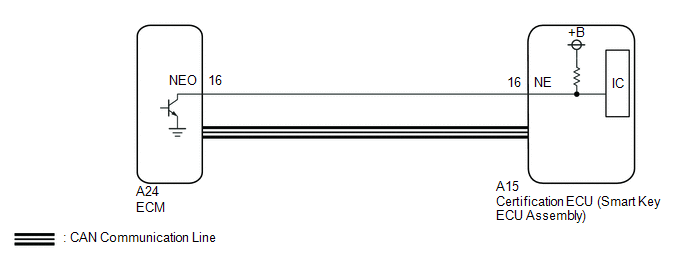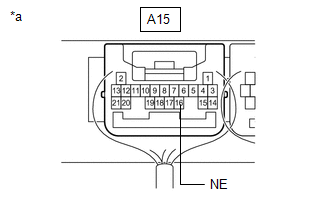- When the signal sent via either the direct line or CAN communication is malfunctioning and indicates no vehicle speed, there is no effect on vehicle behavior. (A malfunction is detected after the engine switch is turned on (IG).)
- When the signal sent via either direct line or CAN communication is malfunctioning and indicates that the vehicle is moving, the engine cannot be started. However, the engine can be started after the engine switch has been turned off.
| Last Modified: 01-30-2024 | 6.11:8.1.0 | Doc ID: RM100000001QT4V |
| Model Year Start: 2021 | Model: RAV4 | Prod Date Range: [08/2020 - ] |
| Title: THEFT DETERRENT / KEYLESS ENTRY: SMART KEY SYSTEM (for Start Function, Gasoline Model): B2286,B228A,P0335; Runnable Signal Malfunction; 2021 - 2024 MY RAV4 [08/2020 - ] | ||
|
DTC |
B2286 |
Runnable Signal Malfunction |
|
DTC |
B228A |
Engine Speed Signal Circuit |
|
DTC |
P0335 |
Crankshaft Position Sensor Circuit Malfunction (NE Signal) |
DESCRIPTION
These DTCs are stored when the engine speed signal sent by the ECM via direct line and the engine speed signal sent via CAN communication do not match.
HINT:
- DTC B2286 is not stored for vehicles with stop and start system.
- DTC B228A is stored only for vehicles with stop and start system.
- When the cable is disconnected and reconnected to the negative (-) battery terminal, the power source mode returns to the state it was in before the cable was disconnected.
|
DTC No. |
Detection Item |
DTC Detection Condition |
Trouble Area |
Note |
|---|---|---|---|---|
|
B2286 |
Runnable Signal Malfunction |
The engine speed signal sent by the ECM via direct line and the engine speed signal sent via CAN communication (1-trip detection logic*) do not match. |
|
Disconnect the cable from the negative (-) battery terminal, wait 30 seconds and reconnect the cable to the negative (-) battery terminal. Wait 20 seconds or more with the engine switch off, then start the engine and maintain an engine speed of 1000 rpm or more for 20 seconds or more. |
|
B228A |
Engine Speed Signal Circuit |
The engine speed signal sent by the ECM via direct line and the engine speed signal sent via CAN communication (1-trip detection logic*) do not match. |
|
DTC Output Confirmation Operation:
|
|
P0335 |
Crankshaft Position Sensor Circuit Malfunction (NE Signal) |
The engine speed signal sent by the ECM via direct line and the engine speed signal sent via CAN communication (1-trip detection logic*) do not match. |
|
DTC Output Confirmation Operation:
|
- *: Only detected while a malfunction is present and the engine switch is on (IG).
Vehicle Condition and Fail-safe Function when Malfunction Detected
|
Vehicle Condition when Malfunction Detected |
Fail-safe Function when Malfunction Detected |
|---|---|
|
|
|
Related Data List and Active Test Items
|
DTC No. |
Data List and Active Test |
|---|---|
|
B2286 B228A P0335 |
Power Source Control
Starting Control
|
WIRING DIAGRAM

CAUTION / NOTICE / HINT
NOTICE:
- When using the Techstream with the engine switch off, connect the Techstream to the DLC3 and turn a courtesy light switch on and off at intervals of 1.5 seconds or less until communication between the Techstream and the vehicle begins. Then select the vehicle type under manual mode and enter the following menus: Body Electrical / Smart Key. While using the Techstream, periodically turn a courtesy light switch on and off at intervals of 1.5 seconds or less to maintain communication between the Techstream and the vehicle.
- The smart key system (for Start Function) uses the LIN communication system and CAN communication system. Inspect the communication function by following How to Proceed with Troubleshooting. Troubleshoot the smart key system (for Start Function) after confirming that the communication systems are functioning properly.
- Inspect the fuses of circuits related to this system before performing the following procedure.
- Before replacing the certification ECU (smart key ECU assembly), refer to the Registration.
- After repair, confirm that no DTCs are output by performing "DTC Output Confirmation Operation".
PROCEDURE
|
1. |
READ VALUE USING TECHSTREAM (ENGINE CONDITION, ENGINE SPEED) |
(a) Connect the Techstream to the DLC3.
(b) Turn the engine switch on (IG).
(c) Turn the Techstream on.
(d) Enter the following menus: Body Electrical / Power Source Control / Data List.
(e) Read the Data List according to the display on the Techstream.
Body Electrical > Power Source Control > Data List
|
Tester Display |
Measurement Item |
Range |
Normal Condition |
Diagnostic Note |
|---|---|---|---|---|
|
Engine Condition |
Engine state |
Stop or Run |
Stop: Engine stopped Run: Engine running |
- |
Body Electrical > Power Source Control > Data List
|
Tester Display |
|---|
|
Engine Condition |
(f) Enter the following menus: Body Electrical / Starting Control / Data List.
(g) Read the Data List according to the display on the Techstream.
Body Electrical > Starting Control > Data List
|
Tester Display |
Measurement Item |
Range |
Normal Condition |
Diagnostic Note |
|---|---|---|---|---|
|
Engine Speed |
Engine speed |
0 to 16383 rpm |
Fluctuates in accordance with engine speed |
- |
Body Electrical > Starting Control > Data List
|
Tester Display |
|---|
|
Engine Speed |
OK:
The Techstream display changes correctly in response to the engine condition.
| OK |

|
|
|
2. |
CHECK HARNESS AND CONNECTOR (CERTIFICATION ECU (SMART KEY ECU ASSEMBLY) - ECM) |
(a) Disconnect the A15 certification ECU (smart key ECU assembly) connector.
(b) Disconnect the A24 ECM connector.
(c) Measure the resistance according to the value(s) in the table below.
Standard Resistance:
|
Tester Connection |
Condition |
Specified Condition |
|---|---|---|
|
A15-16 (NE) - A24-16 (NEO) |
Always |
Below 1 Ω |
|
A15-16 (NE) or A24-16 (NEO) - Other terminals and body ground |
Always |
10 kΩ or higher |
| NG |

|
REPAIR OR REPLACE HARNESS OR CONNECTOR |
|
|
3. |
CHECK CERTIFICATION ECU (SMART KEY ECU ASSEMBLY) |
|
(a) Reconnect the certification ECU (smart key ECU assembly) connector. |
|
(b) Reconnect the A24 ECM connector.
(c) Using an oscilloscope, check the engine speed input signal waveform at the terminal of the certification ECU (smart key ECU assembly).
OK:
|
Tester Connection |
Condition |
Specified Condition |
|---|---|---|
|
A15-16 (NE) - Body ground |
Engine stopped |
No pulse generation |
|
Engine running |
Pulse generation |
| OK |

|
| NG |

|
|
|
|
![2021 MY RAV4 [08/2020 - 12/2021]; THEFT DETERRENT / KEYLESS ENTRY: SMART KEY SYSTEM (for Start Function, Gasoline Model): HOW TO PROCEED WITH TROUBLESHOOTING](/t3Portal/stylegraphics/info.gif)

